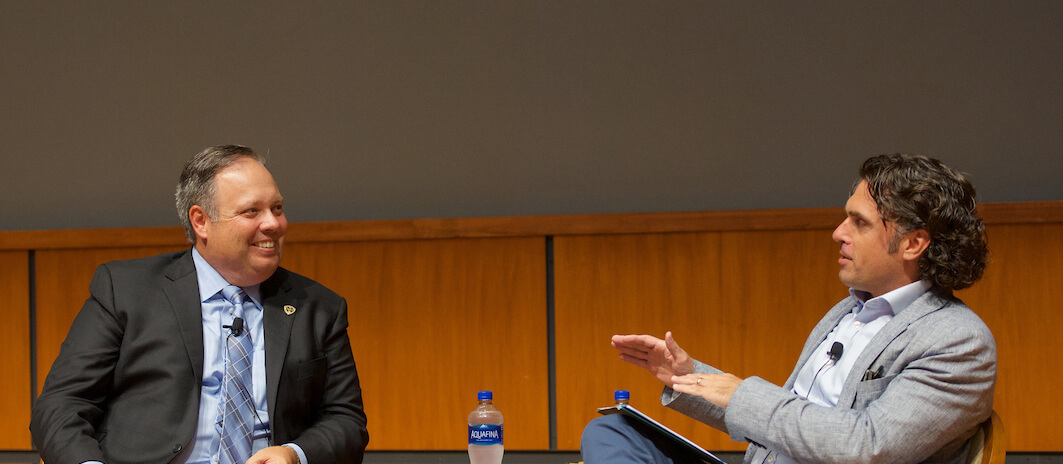What is it like to blow the whistle on a multimillion-dollar Ponzi scheme? We asked Scott Noble to walk us through his experience as a whistleblower in a financial fraud case that led to the conviction and incarceration of his business associate, the owner of Samex Capital, Keenan Hauke. Scott stressed the importance of being proactive, finding moral clarity, and seeking allies to support your effort to do the right thing.
What follows is an edited transcript of a discussion between Scott Noble and NDDCEL Executive Director, Christopher Adkins, as part of the Berges Lecture Series in Business Ethics.

Investigating Proactively
Christopher Adkins: Can you walk us through your discovery?
Scott Noble: I have a computer technology background, so if someone in the office had a computer technology question they always came to me. I would either fix it or hire an outside consultant to come in and take care of it. But I came in the office one Wednesday afternoon, and the computer consultant was there working on the server. This surprised me because I didn’t know anyone was having problems. Mr. Hauke made it a point to come out of his office and chase me down. He said, “Hey, I just had an issue. I called him to come down and take care of it.” But that was unusual. It was a small office, and everything usually came to me.
I often worked late, so I waited until everyone left. I went on the server and I did a differential to see what had changed. I found a folder of files that were statements to Mr. Hauke's investors. I knew these were real statements because they were addressed to people I knew: his mother, his sister, his grandparents, his church. So I knew these weren’t fake statements to puff assets. But there was a problem with these statements. They were showing different rates of return than the accounting firm that was managing the hedge fund had calculated. I knew fairly well the rates of returns because we had marketing material that showed the month by month returns of this fund. And many of these statements did not have matching rates of return.
My first thought was, these files can’t go away. So I got my jump drive out and made myself a copy.
Finding Moral Clarity
Christopher Adkins: As soon as a situation like this starts to unravel, many, including myself, would just start freaking out. You, on the other hand, don’t seem to have hesitated. I am very fascinated by the way you processed this. It seems it was black-and-white to you.
Scott Noble: To me, there was no grey area. People have asked me, "Why didn’t you just ignore it and find another job?", or "Why didn't you confront him—maybe he would have fixed it?" No. For me, at that moment, it boils down to him stealing people’s money. He is no different than the pickpocket. He is no different than the person that breaks into your house and steals your safe. He is stealing people’s money. Just because his mechanisms are electronic does not make him any different. He is knowingly taking your money and putting it in his own pocket.
Christopher Adkins: Some people in this case would look at the ambiguity here and not call a thief a thief, but rather use different words...
Scott Noble: I think it’s because we have the tendency to sanitize some of the processes that happen in business. When people embezzle money or steal money through Ponzi schemes like this, we try to sanitize it by using a different word. We might say “embezzlement” instead of “theft,” but it’s the same outcome.
I was also a victim of this crime. I did not have any investments in the fund, but there were potential negative outcomes for me personally. But even if those outcomes did cost me financially, what greater right do I have to my money than a victim that he was taking money from?
I was at a point where I knew about the crime and I had to figure out a way to put a stop to it. There was no one else who understood what was happening at that precise moment. It was a legal, but more importantly a moral obligation, even to the people that I didn’t know. Somebody was stealing their money, and I had the ability to put an end to it.
Seeking Allies
Scott Noble: I created a spreadsheet just so I understood what I had. I found over sixty individual accounts with about $10 million. I went down to the accounting firm who was supposed to calculate returns and generate the statements and send them to the clients. They said, “We don’t know these people.” I said, “Well they’re in the fund, or they think they’re in the fund.” The accounting firm was not a specialist in this field, and the principal asked me, “What does this mean?” I said, "He’s already committed a felony if he sent these to anybody. If he stole money, that’s another set of felonies, even if he put the money back." He was creating fake statements, and you don’t spend the time creating over sixty fake statements every month for some benign reason.
Christopher Adkins: So now, you’re already attributing what the intent is and the severity of it?
Scott Noble: Yes. I needed to know one thing though, before I turned him in to the authorities. I needed to have a little more understanding in this: Is he really stealing money? Because if I go to the authorities and turn him in, I could potentially ruin his career and maybe my own career as well for no good reason. I have a neighbor and friend who is a private investigator that I called to ask if he could get me banking relations if I could get him an E.I. number. He said, "Sure." Within an hour, he texted me two bank accounts. The accounting firm only had capital controls and only knew about the existence of one of the bank accounts. At that point, there was no doubt in my mind.
Going Public
Christopher Adkins: Walk us through what happened when you made the report.
Scott Noble: My first advice is get a lawyer. You will need one throughout this process. I eventually got interviewed by the SEC, the FBI, and did deposition with the state. You do not sit through those interviews without your own attorney who’s representing your own interests. They don’t know whether you’re part of the crime or not, and they’ll try to find ways to put some culpability on you. So, get a lawyer. Once you get past the criminal proceedings, there’s a receiver assigned to chase down assets and recovery for victims. You’ll need a lawyer to get through that as well.
When we did the reporting, my first concern was investor assets: Can he steal more money? So, I asked my lawyer, "What is our best strategy to stop this guy cold?" He said, we should go with what is called a "noisy exit" strategy. So, the next day, I decided to resign publicly. I sent out an email saying, "I resign from my position as a manager. I have found financial irregularities and I am reporting my findings to the SEC and the state’s securities division." I didn’t finish sending all the emails before my phone started ringing. The first thing people wanted to know was, “Is my money safe?”
Christopher Adkins: Did you have your lawyer check your email before you sent it?
Scott Noble: Yes, he helped me craft it. We had to use specific terms. So, for example, I couldn’t say, “I found a crime.” I said “I found financial irregularities.” (I am not the one who decides whether it is, in fact, a crime.) The reason this strategy is so effective is that you turn all eyes on the perpetrator. The perpetrator has to explain himself. Otherwise the perpetrators would point the finger at the whistleblower. Even in larger companies, whenever there is an issue, you’ll often see that whistleblowers are discredited—they’re not "team players." That is why this problem exists. It takes courage to stand up and take a risk to correct what you know is not right. The noisy exit helps you by putting the onus on the perpetrator.
It also forces the authorities to do something about it, because now they’re getting hundreds of phone calls from investors. They can’t ignore it. They have a prioritization of cases, so if they get a lot of phone calls, they’re going to take a look into it.
We did that on a Friday. Mr. Hauke called me. I did not answer my phone. Then he called my lawyer and wanted to know what we wanted. My lawyer said, “We don’t want anything except for you to make it right. And I suggest you find your own representation because you’re going to need it.” On Tuesday, the state came in to interview him. Less than two weeks from my discovery, the state got an emergency order to freeze his assets. In two months, the state seized his assets officially, and he plead guilty. In March of 2012, less than a calendar year from my discovery, he was sentenced to 10 years and a month and remanded onsite.
Looking Back
Christopher Adkins: Would you do it again?
Scott Noble: I get that question a lot. Most certainly, I would do it again. I sleep well at night. I know I did the right thing. I’m completely comfortable that the impact of what I did was necessary to correct the matter. How much money do people usually recover when they’re victims of Ponzi schemes? Zero. But because we caught this person in the act, it was all adjudicated and the recoveries came through. People recovered 33 cents on the dollar. That might sound terrible, but that’s much more than most victims get. So I’m very proud of the fact that the victims did get something back.
To be a force for good, you have to take proactive actions. That’s the expectation here at Notre Dame. We champion morals, and that means that as a member of the Notre Dame family you have to do that for the rest of your life. You have to be proactively looking out and making change.



